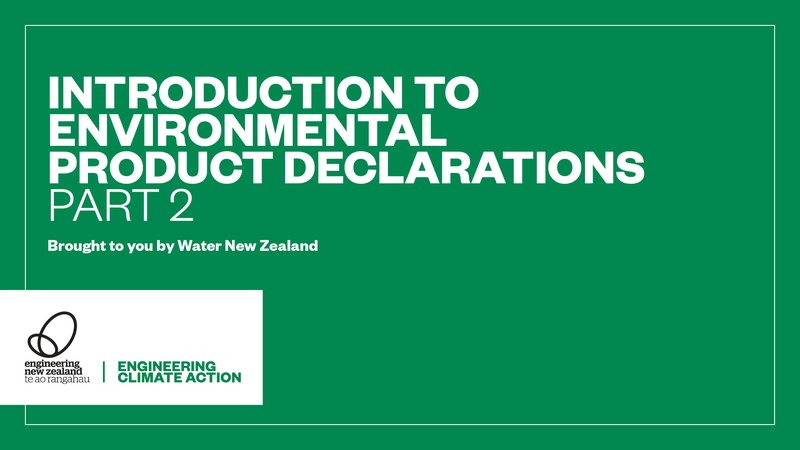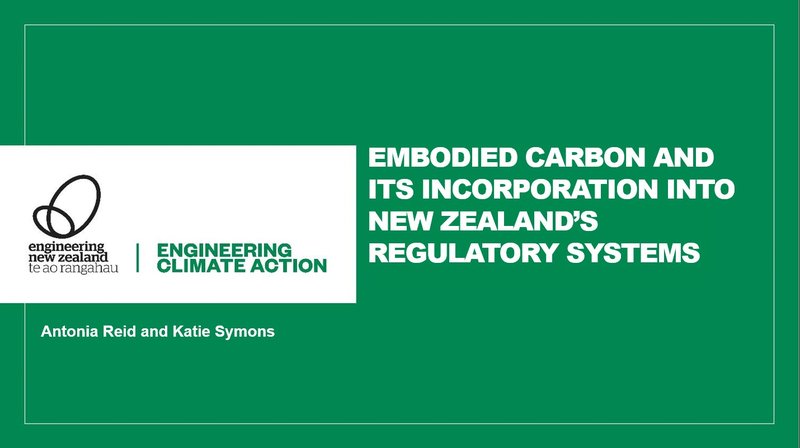Webinars to support Engineering Climate Action
Powering New Zealand's future
Learn about the role of offshore wind in achieving decarbonisation goals. Hear about the challenges that engineers will need to overcome and the skills required to deliver offshore wind projects.
Electricity demand in Aotearoa is expected to grow rapidly in the coming decades as we electrify our economy to achieve our decarbonisation goals. To meet the growing need for renewable electricity supply, many countries are turning to offshore wind to deliver generation at scale. Numerous developers are now actively working on offshore wind projects in Aotearoa.
Member Connect Leaders' Discussion: Climate adaptation – regrouping and refocusing
It's crucial that we adapt to the changing climatic conditions in Aotearoa. Over the past 18 months, natural disasters including the Auckland Floods, Cyclone Gabrielle and the recent Wairoa flood have shown that adapting to climate change “has become a sprint”.
Engineers play a critical role in the adaptation challenge but must regroup and refocus to ensure the right solutions are developed. In this Leaders' Discussion, you'll hear from some of the best minds in climate adaptation about how to address the main challenges and how different perspectives and approaches can reinvigorate national cooperation on this pressing issue.
PAS2080 – An industry-wide enabler for decarbonisation
It's critical for engineers to understand carbon management and emission reduction strategies in the built environment. PAS2080 is a global best practice standard for carbon management in buildings and infrastructure projects, and can help you drive industry innovation through leadership, collaboration and a commitment to continuous improvement.
WSP bridge engineer Lowri Swygart gives a thorough overview of PAS2080 and demonstrates how it can assist your journey to net zero.
Ngāwhā Generation – Carbon Zero project
Ngāwhā Generation, a subsidiary of Top Energy Group, operates a small fleet of geothermal power stations located in the far north of New Zealand. The small team of 14 staff produces around 450 GWh boasting some of the highest availability metrics for this class of generation plant globally.
In this Climate Conversation, you'll discover how Ngāwhā Generation reduced its greenhouse gas emissions to become one of the first zero-emissions power stations in Aotearoa.
A university's journey towards a sustainable future
Hear from Professor Jan Evans-Freeman, Pro-Vice-Chancellor Sustainability at the University of Canterbury (UoC) and Engineering New Zealand President, about the university's journey towards sustainability.
Learn about UoC's ambition to meet the United Nations Sustainable Development goals and how they ranked first in the world for the Responsible Consumption and Production goal in 2022.
The Mauri Model Decision Making Framework
In this Climate Conversation, Dr Kēpa Morgan DistFEngNZ (Ngāti Pikiao of Te Arawa) presents on the Mauri Model Decision Making Framework. This innovative decision-making tool considers a range of worldviews, from mātauranga Māori to engineering and science, and uses the concept of mauri (lifeforce) as the measure of sustainability, observing the four dimensions of environmental, cultural, social and economic wellbeing.
Dr Morgan is an experienced Consultant Engineer, Researcher, Academic and General Manager with an accomplished track record working with indigenous knowledge in complex systems, renewables, forestry and water resource management.
New Zealand Battery Other Technologies Feasibility Study (NZBOTFS)
New Zealand has large renewable energy sources but we still face power generation shortfalls in a "dry year". These are currently addressed by burning fossil fuel. The New Zealand Battery Project sought practical options to provide dry year generation from renewable resources. Hear from Dr Lindsay Robertson and Rebecca Tjaberings, presenting on the New Zealand Battery Project Other Technologies Feasibility Study – commissioned by MBIE to investigate a reduction in reliance on coal-fired generation.
Embodied carbon and operational efficiency for New Zealand buildings
Katie Symons and Elrond Burrell present on MBIE’s Building for Climate Change programme, charting the course for the regulation of embodied carbon and operational efficiency for buildings in Aotearoa. Katie gives an update on the technical methodology for embodied carbon and Elrond delves into the technical methodology for operational efficiency.
Can we fix it? Yes we can – but only with a systems view
Dr Catherine Knight gives an insightful and thought-provoking presentation on the need to take a systems view to combat climate change. She explores the concept of Carbon Tunnel Vision, Planetary Boundary Overshoot and how we can best support the transition to a sustainable future.
Catherine Knight is an award-winning writer, environmental historian and a policy practitioner currently working at the interface between urban planning and transport.
Shifting economics and the roles of engineering
It is increasingly plausible that economics will shift from outdated assumptions of 'rational man' to a more diverse and human-centred approach focused on satisfying needs within ecological limits. We explore this shift and how it may impact engineering.
Jennifer Wilkins is founder of Heliocene.org, an international advisory and advocacy practice focused on a post-growth business transition. She has a corporate professional background, with past roles spanning management accounting, infrastructure proposals management and impact programme management within the manufacturing, forestry and construction sectors.
The Living Pā
As a purpose-built living lab, the Living Pā at Victoria University of Wellington Te Herenga Waka will be an incubator for innovation, and a place for multiple communities and disciplines to come together to discuss how we can build a more equitable, fair and sustainable society.
Structural Engineer and Project Manager, James McLean from L.T McGuiness talked about how the redevelopment proposes to meet the internationally recognised Living Building Challenge for sustainable development principles. This means it must generate all its own energy, use its own water systems, be entirely carbon-neutral and use non-toxic materials. It also must prove, a year after completion, that it’s as sustainable as it claims.
Energy futures – a “net energy” lens
Through a systems perspective combining economics, environment and energy, Transition Engineer Nathan Surendran presents a broad perspective on the polycrisis (a cluster of related global risks with compounding effects, such as Covid-19, the war in Ukraine, cost-of-living and the climate crisis) and explains how energy futures look through a ‘net energy’ lens.
Scott Base Development Project
Karissa Hyde and Clare Paynter, two of the most in-the-know engineers on the Scott Base Redevelopment, discuss this challenging and exciting Antarctic Project, including the upgrade of the Ross Island Wind Energy System.
Introduction to Environmental Product Declarations – part 2
In part 2 of this Climate Conversation discussing Environmental Product Declarations (EPD), brought to you by Water New Zealand, experts share the process of producing, procuring and decision-making using EPDs.

Introduction to Environmental Product Declarations – part two
Introduction to Environmental Product Declarations – part 1
Environmental Product Declarations (EPDs) offer credible, data-based, and verified information that support sustainable product choices. This Climate Conversation informs product manufacturers, suppliers and operators on the purpose of EPDs and how they are produced and used. Through case studies, you’ll also learn how EPDs are used from both an operator/product and supplier/manufacturer perspective. This Climate Conversation was brought to you by Water New Zealand.
NZGBC Rating Tools – for better and more sustainable buildings
Buildings and their construction account for as much as 20% of New Zealand's emissions. New Zealand Green Building Council, Te Kaunihera Hanganga Tautaiao (NZGBC) is on a mission to change that. In this Climate Conversation, Brad Crowley from NZGBC discusses the benefits of green building certifications, including the different rating tools managed by NZGBC. He also talks about the new update to the rating tool, Green Star Buildings and how engineers can make sure this new tool is fit for purpose for New Zealand.
Embodied carbon and its incorporation into New Zealand’s regulatory systems
Antonia Reid, Policy Director for the Building for Climate Change Programme, and Katie Symons, Principal Advisor, Engineering, from MBIE’s Building System Performance Branch presented on embodied carbon. They cover technical methodology, what engineers need to know and what’s next in incorporating this into the regulatory systems.

There is no recording but Antonia and Katie have kindly agreed to share their slides from this climate conversation
Key Principles of a Circular Economy
In this Climate Conversation, Debbie O'Byrne discusses the key principles of a Circular Economy (CE), to help engineers understand and leverage the shift in thinking a CE transition creates.
NZ concrete industry's journey towards NET ZERO carbon
Ralf Kessel is the convener of the Concrete NZ Masonry Sector Group and the Concrete NZ Sustainability Committee established in 2019. In this Climate Conversation, he discusses the industry's journey towards NET ZERO carbon.
Research for reducing environmental impact involving renovations of historic buildings in New Zealand
Rachel Paschoalin shares her research involving renovations of historic buildings in New Zealand, towards a holistic method for reducing environmental impact.
A hospital pass
Jack Young, a mechanical engineer, discusses how the heavily regulated, change-averse healthcare sector has begun to drive transformational change to tackle the task of energy transition – and what can be learned and applied across other industries.
What Te Ao Māori can teach us about climate change
In this first Climate Conversation, Akuhata Bailey-Winiata (University of Waikato) shares his work on the relevance and application of Mātauranga and Te Ao Māori in climate change.

